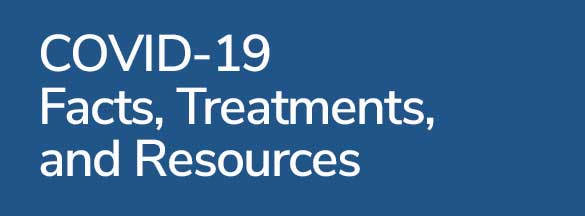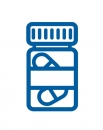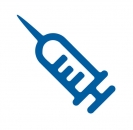Section 5: Treatments, Vaccines, and Testing

| Section 1: What Kills the Virus? |
| Section 2: How is it Transmitted? |
| Section 3: Symptoms & Emergency Care |
| Section 4: Will I Get Seriously Ill from COVID-19? |
| ► Section 5: Treatments, Vaccines, and Testing |
| Section 6: COVID-19 Resources |
Treatments, Vaccines, and Testing

Treatments
The latest information on COVID-19 therapeutics may be found on the Administration for Strategic Preparedness and Response (ASPR) website. ASPR is a division of the US Department of Health and Human Services (HHS), the agency that initially provided this information through “Combat Covid.” This initial resource, however, has been replaced by this new section of the ASPR website.
In addition to information on COVID-19 prevention and COVID-19 treatment options, this new section includes important topics such as vaccines, what to do if exposed, people with weakened immune systems, people at risk of serious symptoms, and more. Information may also be found on the nationwide Test to Treat initiative, a program designed to help people quickly access lifesaving treatments for COVID-19 at little to no cost.
COVID-19 Treatment Overview
In general, most treatments for COVID-19 largely include antiviral medications and monoclonal antibodies. Antiviral medications work by stopping the virus from multiplying in the body. Monoclonal antibodies work by stopping the virus from spreading in the body. One medication consisting of two monoclonal antibodies, Evusheld™ (tixagevimab co-packaged with cilgavimab and administered together), is used for the prevention of COVID-19 in certain high-risk adults and pediatric individuals (12 years of age and older) who have not been exposed to COVID-19.
Since COVID-19 is a new virus, treatments need to be studied and tested before they can be recommended. As certain treatments – such as antiviral medications and monoclonal antibodies – show effectiveness in clinical trials, these may receive “Emergency Use Authorization,” or an “EUA” from the United States Food and Drug Administration (FDA). This allows a new, urgently needed medication to be prescribed prior to its official approval, which requires more time. As more studies are completed, an effective medication, whose benefits outweigh the risks, may advance from having an EUA to receiving full approval from the FDA.

Vaccines
Given the serious nature and risks associated with COVID-19, MSAA, along with all of the MS organizations within the MS Coalition, supports the MS community getting the COVID-19 vaccine in coordination with one’s healthcare provider.
The Centers for Disease Control and Prevention (CDC) has created a tool to provide the latest COVID-19 vaccine information as well as help you to find the closest location to receive a vaccine or booster. For a list of nearby vaccination sites, you may also search vaccines.gov, call (800) 232-0233, or simply text your zip code to 438829.
According to the CDC, the federal government provides COVID-19 vaccines free of charge to everyone living in the United States, regardless of their immigration or health insurance status. This site explains that you cannot be billed in any way for a COVID-19 vaccine or booster, and warns individuals to beware of scams.
The CDC also offers helpful vaccine guidance including: how to prepare for your vaccination, what to expect at your appointment and immediately after, and things such scheduling your boosters, or what to do if you’ve lost your vaccine card. Follow CDC guidelines about what you can and cannot safely do once you are fully vaccinated.
COVID-19 Vaccination Overview
The following information appears on the Centers for Disease Control and Prevention (CDC) website at Overview of COVID-19 Vaccines | CDC. Please visit this website for any late-breaking news and updates.
What You Need to Know
· Four COVID-19 vaccines, which include primary series and boosters, are recommended in the United States.
· Vaccine recommendations are based on age, the vaccine first received, and time since last dose.
· People who are moderately or severely immunocompromised have specific recommendations for COVID-19 vaccines, including boosters.
· Side effects after a COVID-19 vaccine are common, however, severe allergic reactions after getting a COVID-19 vaccine are rare.
Types of COVID-19 Vaccines Available
There are four approved or authorized vaccines in the United States. Please visit the CDC’s website for “Understanding How COVID-19 Vaccines Work.”
- Pfizer-BioNTech and Moderna COVID-19 vaccines are mRNA vaccines.
- Novavax COVID-19 vaccine is a protein subunit vaccine.
- Johnson & Johnson’s Janssen (J&J/Janssen) COVID-19 vaccine is a viral vector vaccine and can be given in some situations.
For more information, please visit the CDC’s webpage on “Understanding How COVID-19 Vaccines Work.”
These vaccines are given as a shot in the muscle of the upper arm or in the thigh of a young child. COVID-19 vaccine ingredients are considered safe for most people. Nearly all of the ingredients in COVID-19 vaccines are ingredients found in many foods – fats, sugar, and salts. None of the COVID-19 vaccines affect or interact with our DNA.
After the body produces an immune response, it discards all of the vaccine ingredients, just as it would discard any substance that cells no longer need. This process is a part of normal body functioning.
Testing
The Centers for Disease Control and Prevention (CDC) provide a COVID-19 testing overview for individuals to learn about the different types of testing available for COVID-19. Basic details and short informational videos are included.
A subsection on the CDC’s website provides information and instructional videos – both in English and Spanish – on the topic of “self-testing.” Also referred to as “at-home testing,” this section gives vital details on what this test is, when to take this test, what to do if you have positive or negative results, and where to get at-home tests.
In general, if you are experiencing symptoms, you should self-test immediately. If you have been exposed to someone who was positive for COVID-19, you should self-test within 5 days, and again in another 1-2 days if the first test was negative.
Individuals with a positive COVID-19 test need to stay home and isolate themselves from others for 5 days. They should notify anyone close to them who may have been exposed, and watch for any severe symptoms, such as trouble breathing, pain in the chest, or confusion. The CDC also recommends that you tell your doctor if you are positive for COVID-19, and contact them immediately if your symptoms worsen, you are an older adult or have other medical conditions, or if you have any questions about your isolation.
Check here for the latest COVID-19 statistics.

| Section 1: What Kills the Virus? |
| Section 2: How is it Transmitted? |
| Section 3: Symptoms & Emergency Care |
| Section 4: Will I Get Seriously Ill from COVID-19? |
| Section 5: Treatments, Vaccines, and Testing |
| Section 6: COVID-19 Resources |
